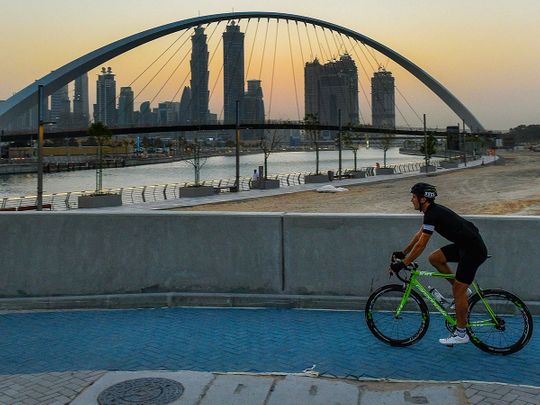
When I was about 5 or 6 years old, my mother set me down on a purple banana-seat bike. She gripped the back of the seat while I found my balance. Then she gave me a push and let me go, calling, “Pedal, pedal, pedal, glide!” as I rode across the lawn.
I pedalled and glided just fine, but forgot to steer, and my inaugural ride concluded with a face-first crash into our neighbours’ mailbox.
When I was older, my bike gave me freedom. My mom was happy to sign off on me joining a travel soccer team, as long as I understood that she would not be driving me to practices. “You can ride your bike.”
So I did, with a soccer ball bulging in my backpack. Sometimes I envied my teammates as they climbed into minivans and station wagons after a gruelling practice. Mostly, I felt lucky. On my bike, my time was my own. I could pluck an apple from a tree in the orchard near the soccer field and eat it while I pedalled home, or ride to the mall, spend an hour browsing in Waldenbooks and go home with a few new paperbacks and a quarter-pound of dark-chocolate-covered pretzels.
I got married and had babies. Leaving the house for a two-hour ride was no longer an option. I put my touring bike in the basement. I rode a sturdy hybrid, put my daughters in a trailer, and towed them around for 10- or 15-mile jaunts. When my girls got older, my mom taught them to ride their own bikes in Cape Cod.
“Pedal, pedal, pedal, glide!” she’d shout as they wobbled through the Corn Hill Beach parking lot, only this time it was me chasing after them with my hand on the seat, forcing myself to let go.
Then the Covid-19 pandemic came. The gyms closed. While it seemed like everyone else was setting up a Peloton and pedalling to nowhere, I was desperate for real-life companionship and fresh air. The bicycle club was still there. My daughters were teenagers, who’d be fine — delighted, even — being without me for a few hours. Entire weekends, even. I could start riding again.
Last spring, my mother died.
It was sudden, a dizzying skid through the guardrails and down into the abyss. She was diagnosed with pancreatic cancer in early March. She was in and out of hospitals for the next four weeks. She managed one round of chemo and was able to come home, briefly, and marry her partner of 18 years. By the first week of May, the doctors determined that there was nothing left to do but let her die, free of pain, in peace.
When my publisher scheduled a book tour, I rode my bike to almost all of the events: 50 miles from Truro to Sandwich in Massachusetts. Thirty-five miles from Philadelphia to Collegeville, 40 miles from Philadelphia to Princeton, 77 miles from Princeton to Northvale, New Jersey. I rode through thunderstorms and driving rain and the worst of the summer’s heat and humidity. I’d pedal until my sad, chattering brain went quiet and the pain in my body overwhelmed the hurt in my heart.
I’m not a girl, no longer a young woman. I’m old enough to know that you can’t outrace grief, and there’s no finish line for sorrow, no ribbon you go crashing through that signals its endpoint. The only cure is time.
But I found that this exercise could help. Pushing my body to a place where all I can feel is exhaustion is a cure my mother taught me. She was a cyclist and a swimmer and a walker and a hiker. When she was 75, she hiked five miles in Glacier National Park to pose by Avalanche Lake with my husband, my daughters and me. “When you’re 75,” she said, “remember that I did this.”
I remember. The memory hits me like a fist. So I get on my bike and I ride — up hills, along paths, over bridges, from the city to the shore. I know that, someday, what feels like a knife in my heart won’t hurt as much. I know that the pain will become less constant, a manageable ache that flares to agony when I see an empty chair at a Thanksgiving meal.
My mother taught my girls to ride their bikes; someday, maybe, I’ll teach my own grandchildren. I lost my mother; someday my daughters will lose me. The wheels go around, loss chasing joy, happiness following sorrow. Pedal, pedal, pedal, glide.
Jennifer Weiner is the author, most recently, of the novel “That Summer.” She lives and rides her bicycle in Philadelphia.
- The New York Times







